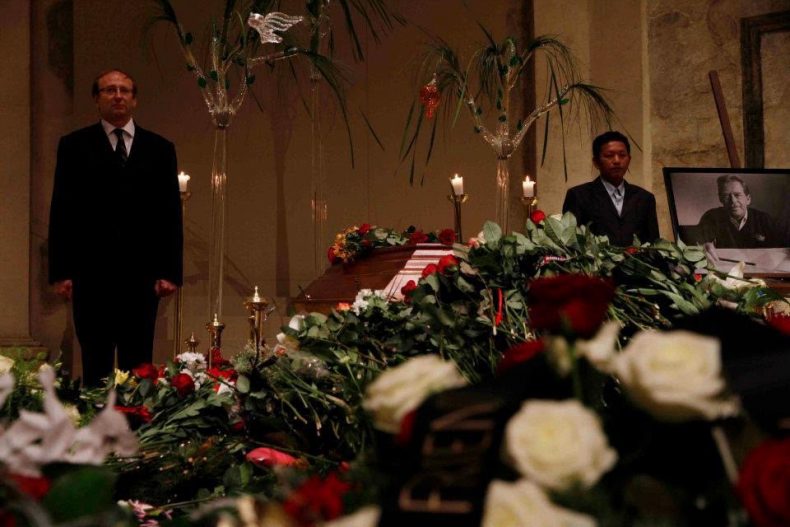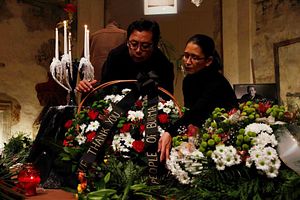On January 18, 2017, the Swedish parliament organized a festive event to commemorate the 40th anniversary of Charter 77, the Czechoslovakian human rights movement led by the famous playwright Václav Havel (who became, with the fall of the Iron Curtain in 1989, the president of his country) and other dissidents. One of the speakers, Sabe Soe from Myanmar, highlighted the importance of Havel’s legacy in her native country. Havel was also fondly remembered in a speech by Myanmar’s State Counselor Daw Aung San Suu Kyi on November 17, 2016, when she participated – together with President U Htin Kyaw – in commemorations for Václav Havel in Naypyitaw, the capital of Myanmar.
But what are the roots of this unexpected closeness between the successful dissident movements of these two distant countries, Myanmar and Czechia?
“I must confess to a particular affinity for the writings of Czech dissidents (or perhaps one should say ex-dissidents, except that I think perhaps some of them will be dissidents for life, their intellectual combativeness ever ready to question the ways of authority, whosoever that may be),” Suu Kyi wrote in her essay “Czechs and Us” in 1998.
As she explained shortly after the demise of Havel in December 2011:
It was during the first year of my house arrest, 1989, that the name of Václav Havel became familiar to me. The Velvet Revolution, the Civic Forum, the electoral victory that turned the premier dissident of Czechoslovakia into the first president of the newly democratic republic: I learnt about it all from my small portable radio and shared in the euphoria of political transformation in that far-off land. However, I did not realize at that time that Václav Havel would become a personal friend.
Suu Kyi admitted,”It is a little strange to speak of a man I had never met and with whom I had barely corresponded as a personal friend.” She added, “It was his vigorous and warm personality and his total commitment to the support of movements for democracy and human rights the world over that made his friendship so real and vibrant and made me feel we were linked to one another by close ties of understanding.”
During and after the fall of the communist regime in 1989, Havel’s name was frequently mentioned as a possible candidate for the Nobel Peace Prize. However, Havel felt that he needed to propose a candidate whose fight was not won yet. One of his aides, Stanislav Slavický, travelled to Japan in 1990, where he met a group of Burmese exiles asking for Havel’s support for Suu Kyi’s Nobel Peace Prize nomination. Soon after, Havel also received a circular letter from Suu Kyi’s husband, Michael Aris, asking for the same. He decided to formally nominate her, and after establishing contact with a group of U.S. congressmen, the committee of Professor Finnis, and the actress Liv Ullmann, they joined forces to campaign to award her the Nobel Peace Prize, which she eventually received in 1991. This was the beginning of their long-distance friendship.
“He nominated me for the Nobel Peace Prize in 1991 because he believed it would help to focus international attention on our struggle,” Suu Kyi commented later. “Had he allowed his name to be put forward as a candidate that year I am convinced he would have been the chosen laureate. He surely valued the Nobel Peace Prize, for he would not have wanted to give to the cause of democracy and human rights something which he did not value himself. But it was a matter of chivalry: ‘Their need is greater than mine.’”
Fighting for Freedom
Havel became an admirer of Suu Kyi, and his support to her didn’t stop after the successful Nobel campaign. In 1991, he wrote a preface to the collection of her essays “Freedom from Fear.” In the Czech Republic, Havel’s support to Suu Kyi grew into a wide range of activities in support of her National League for Democracy (NLD), political prisoners, and people in Myanmar’s ethnic war zones. To this aim, he participated in programs conducted by the People in Need foundation, the Transition Policy and Human Rights Department of the Czech Ministry of Foreign Affairs, members of Parliament, or the Czech Film Academy. In January 1997, Suu Kyi was awarded an honorary doctorate by the Charles University in Prague, received ceremonially on her behalf by her husband. The Czech Republic also took a very active stance in the EU (putting the situation in Myanmar among its priorities during its 2009 EU presidency) and in international fora, including the UN.
Havel and Suu Kyi’s mutual contact continued by exchange of occasional letters and messages, as far as Suu Kyi’s detention conditions allowed. For instance, Deputy Foreign Minister Alexandr Vondra, himself a former dissident, traveled to Burma in November 1995, and was able to meet Suu Kyi in her private residence and deliver a personal letter from Václav Havel. She likewise managed to send the NLD’s Peace and Democracy Award through a messenger to its first recipient, Havel, in October 1997; however, an attempt to deliver another letter in 1997 by Tomáš Pojar and Igor Blaževič from the People in Need foundation failed and they were expelled from the country.
Havel himself didn’t cease to be active in his support of Suu Kyi and the cause of Burmese democracy even after his tenure as president ended in 2003. On October 12, 2003, he published a widely quoted article, “Soul of a Nation” about Suu Kyi and Myanmar in the Washington Post. He orchestrated a joint appeal by members of the PEN club demanding the release of imprisoned Burmese writers, including Suu Kyi, in April 2004; the appeal was signed by almost all living laureates of the Nobel Prize for literature. He also launched, together with his friends His Holiness the Dalai Lama, Prince El Hassan bin Talal of Jordan, and Frederik W. de Klerk of South Africa, and others, the Shared Concern Initiative to foster principles of human rights and good governance worldwide. The first public manifestation of this initiative was an open letter in support of Suu Kyi in May 2005.
In September 2005, he proposed, in a report titled “Threat to the Peace” published together with Bishop Desmond Tutu, an intervention by the UN Security Council into the situation in Myanmar, and just few months later, the Security Council indeed debated the Myanmar issue for the first time ever, although without adopting a resolution. The report also called for the immediate release of Suu Kyi and 1,100 other political prisoners.
A Last Chivalric Gesture
“I would like to meet her [Suu Kyi] and give her a rose like the one she is seen holding in a photograph in my study,” Havel wrote in 2005 in an article for the Washington Post. “Continuing democratization of the whole region, together with growing dissent inside the country, must eventually have a positive effect. As Aung San Suu Kyi celebrates her 60th birthday, I wish for her that those changes will happen as soon as possible, and that my silly idea — to hand her a rose — becomes a simple and easy thing to do.”
Havel never got to meet Suu Kyi in person, and besides their correspondence, there was only one conversation by phone between the two, on December 9, 2010, after her release from her house arrest. By then, Havel was already too sick to travel to Asia, but up to his death on December 18, 2011, he remained interested in all things Myanmar, in Suu Kyi’s personal well-being, in the stumbling blocks on Myanmar’s road to democracy, and in the plight of people both in the central area of the country and in the ethnic war zones.
“I received a letter written by Václav Havel in November, just a couple of days after he passed away. It was a surprise that he had remembered us at a time when he was so ill. And the letter was as warm and as modest as the man himself,” Suu Kyi said in a tribute to Havel after his death. She sent a wreath to his funeral, and a delegation of Burmese stood guard of honor at his coffin when it was deposited.

A Burmese representative (R) standing with the author as guard of honor at Havel’s coffin. Image credit: Burma Center Prague
Suu Kyi is no stranger to tributes for her courageous pro-democracy fight. However, one gift which reached her in Naypyidaw in July 2012 was very unusual – it was delivered from beyond the grave by Václav Havel. Together with his other collaborators, Tomki Němec and Martin Vidlák, we remembered his wish to hand her a rose when changes in Myanmar made it possible. We took roses from his coffin, and the artist Bořek Šípek created a symbolic glass artwork using those roses.
In September 2013, Suu Kyi honored Václav Havel’s invitation (which she couldn’t accept during his lifetime, due to her detention) to attend Forum 2000 in Prague, an annual gathering of world political, spiritual, and intellectual leaders. She had a working breakfast with Havel’s friends and collaborators, and we discussed how we could help Myanmar in the future. “When I was under house arrest I knew that here was a man speaking for me. He made me feel free,” she said in Prague. “If he [Havel] were alive today and here with us, I am sure he would say to me, to all of you: It’s not going to be easy but you persevere and you will get there.”
NLD indeed persevered and won a landslide victory in the parliamentary elections in 2015. On November 18, 2015, Suu Kyi wrote in a letter to Michael Žantovský, the director of the Václav Havel Library: “The Czech Republic’s support for our struggle over many decades has been unsurpassed, and I am confident that the ties between our peoples will further strengthen in the years ahead – a fitting tribute to Mr. Havel’s inspirational legacy.”
The following years confirmed that expectation – not only by the significant increase of trade and exchanges on ministerial level, but, importantly, also in continuing cooperation in the field of rule of law. And as a symbolic New Year’s gift for 2017, all 664 member of the bicameral parliament of Myanmar received a Burmese translation of selected Václav Havel essays on the transition to democracy.
Jiří Šitler is a Czech diplomat and historian. He has served as Ambassador of the Czech Republic to the Kingdom of Thailand, the Kingdom of Cambodia, the Lao PDR and the Union of Myanmar/Burma, and as Director for Asia and Pacific in the Czech MFA. He is also the author or co-author of numerous essays, articles, and books, especially on Czech-German relations, World War II-related issues, Czech political history and Southeast Asian history.
































